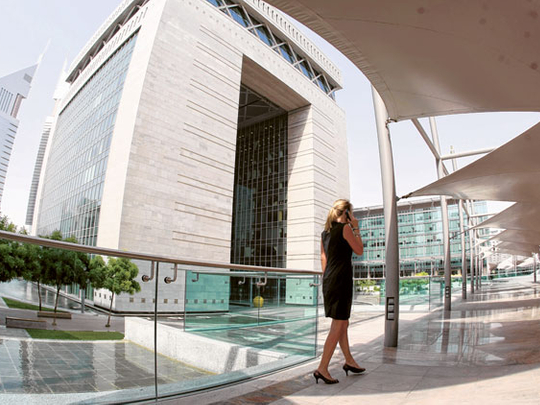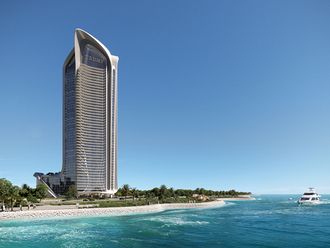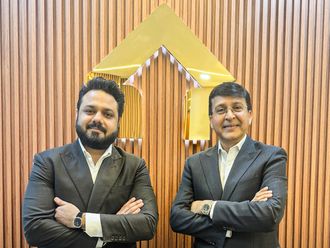
Dubai: Dubai expects two of its main companies to refinance $3.25 billion (Dh11.94 billion) of debt this year without government help as economic growth accelerates.
Dubai doesn't need to raise money from international bond markets in 2012 and has "no intention" of seeking support from Abu Dhabi, Mohammad Ebrahim Al Shaibani, director general of the Dubai Ruler's Court, said in an interview yesterday.
"We have been proving everybody wrong in the last three years and this is going to be a fourth year proving everybody wrong," he said.
"This year is much better than last year in every way you look at it."
Economic rebound
Dubai's default risk has dropped over the past two years as debt restructuring deals, bond repayments and profitability at companies boost confidence in its economic rebound. The benchmark stock index gained 12.5 per cent this year, making it the best performer in the six-nation Gulf Cooperation Council. Dubai's economy may expand as much as 5 per cent this year after growing more than 3 per cent in 2011, Shaikh Ahmad Bin Saeed Al Maktoum, Chairman the Dubai Supreme Fiscal Committee, said yesterday.
Dubai may "muddle" through a financing strategy this year, Bank of America Merrill Lynch said in December. DIFC Investments has $1.25 billion in Islamic bonds maturing in June, while Jebel Ali Free Zone faces maturity of Dh7.5 billion in Sharia-compliant notes in November.
"I'm very confident they will manage to sort out these issues on their own," Al Shaibani said.
"We are available for any advice, any help. But mainly they will manage it themselves."
The emirate's five-year credit default swaps tumbled 46 basis points this year to 399, according to data provider CMA, which is owned by CME Group Inc. and compiles prices quoted by dealers in the privately negotiated market. They remain the fourth-highest in the Middle East.
DIFC Investment's sukuk were at 96.62 cents on the dollar yesterday, near the highest level since November 2007. Jebel Ali Free Zone notes were at 94.64 cents on the dollar, according to data compiled by Bloomberg.
The yield on Dubai's 5.591 per cent government dollar bond due June 2021 has dropped 37 basis points, or 0.37 percentage point, this year to 5.61 per cent.
Rise in passengers
Dubai Airports handled a record 51 million passengers last year, an increase of 8 per cent from 2010, the state-run company said on January 24.
In December, 4.69 million travellers passed through the airport, compared with 4.26 million a year earlier.
Dubai and its state-controlled companies face about $10.3 billion in debt repayments this year, Bank of America Merrill Lynch estimates from October show.
Al Shaibani declined to give an estimate of total debt due this year.
"What people sometimes forget is that for all the noise, the fact is that there has been no default of a traded instrument," Raza Agha, London-based senior economist at the Royal Bank of Scotland Plc, said by e-mail yesterday.
"They didn't default even in 2009 when the situation was worse. Even back then, they paid off the debt. Since then, Dubai's economy has recovered well."
Dubai Holding Commercial Operations Group LLC, a property and hospitality company, paid back a $500 million bond that matured on February 1.
Firms restructuring debt
Several companies are still seeking to restructure debt. Dubai Group LLC offered to pay creditors over five to 10 years as it seeks to restructure $6 billion of bank loans, a banker familiar with the proposal said on February 6. Drydocks World LLC, a ship-repair unit of Dubai World, said in December it may reach an agreement with creditor banks on $2.2 billion of debt in March.
The government is encouraging companies and lenders to reach agreements before seeking government help, Al Shaibani said.
"They should initiate the process of refinancing and sorting out their issues and if they have any issue or difficulty or advice, or if they want support they will come back to us," he said.
Government support doesn't necessarily mean offering debt guarantees, he said. He listed the Dubai Support Fund, set up in 2009 with the help of Abu Dhabi's money, as one potential avenue of assistance "under certain conditions, of course."
Some creditors "thought they just go straight to the government and expect the government to write a cheque," he said, giving the example of Drydocks.
"It doesn't work this way. They have to go through the process, and they have to respect corporate governance."
Monarch Alternative Capital LP, a New York-based investment company, filed a claim of about $45.5 million in a London court in October against Drydocks.
The company is relying on its operations in Dubai to make up for the "challenge" posed by its investments in the Far East, Al Shaibani said.
"In reality, the main money generator is Dubai, and Dubai is doing really well," he said. "They are very busy, almost 100 per cent occupancy. They have a huge business in the pipeline."












